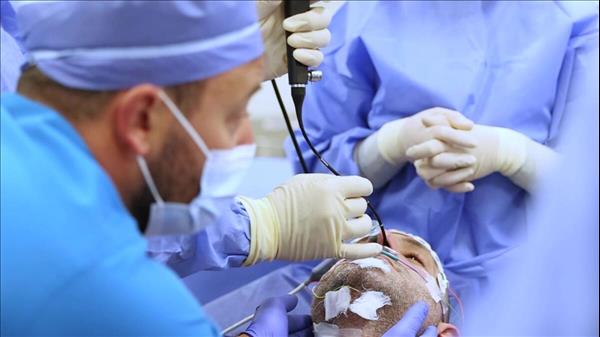(MENAFN- Khaleej Times) Published: Tue 7 Feb 2023, 1:03 PM
Do you snore loudly and make choking sounds while sleeping? You could be suffering from obstructive sleep apnea (OSA) – a common sleep disorder that impairs breathing and results in poor sleep.
OSA occurs when airflow is blocked during sleep. This causes a person to stop breathing for a short period of time, which deprives the body and brain of oxygen. This interrupts sleep, causing loud snoring and choking noises, and results in a person feeling tired, even after sleeping a full six to eight hours. Untreated, it often becomes the silent cause behind other common comorbidities such as hypertension, cardiac diseases, diabetes, and metabolic disorders, as well as strokes or heart attacks.
A multi-specialty hospital in Abu Dhabi has introduced a new diagnostic procedure in the UAE that helps treat people with OSA. The Drug Induced Sleep Endoscopy - Polysomnography (DISE-PSG) procedure involves an evaluation of how a person's upper airway performed at various sleep stages. This, coupled with a synchronising polysomnogram, also known as a sleep study, allows doctors to observe the stage of sleep a person is in, as well identify episodes of airflow obstruction, which was not previously possible.
Photo element:
Healthpoint, a Mubadala Health partner, has successfully treated a 35-year-old patient using this new procedure.
The patient, who had been living in the UAE for five years, suffered from OSA. After trying many different traditional treatment options, including a continuous positive airway pressure (CPAP) therapy, he turned to Healthpoint's multidisciplinary team, made up of specialists in sleep, anesthesiology, orthodontics and ear, nose and throat (ENT) issues.
Dr Favas Thaivalappil recommended the DISE-PSG procedure to the patient, and the team was able to use the comprehensive 3D evaluation procedure to diagnose and classify his complicated respiratory issue on the same day.
“After feeling a bit helpless from not seeing results from the various treatment options, it was a huge relief that after a few short and painless hours, Healthpoint's multidisciplinary team were able to pinpoint exactly what the issue was, and the different treatments options available to me, all in the same day,” the patient said.
“I walked away with a customised and alternative treatment option. From this approach, I am now able to consider different options that we know will work, from oral appliances to a specific type of surgery to treat my OSA. After years of struggling with this condition, I am looking forward to that first night of rested sleep soon.”
Photo: Dr Thaivalappil Dr Thaivalappil, pulmonology and sleep medicine consultant and head of Sleep Center, Healthpoint, said:“We often see a lot of patients affected by sleep-related breathing disorders complaining about a lack of sleep, many of [whom] have underlying conditions that can cause high blood pressure or cardiac issues. We can usually determine the root cause of the issue and treat the conditions effectively. However, in patients who are unable to comply with traditional sleep therapy options, a personalised approach is essential to identify their underlying cause and to plan the treatment accordingly.”
Dr Thaivalappil noted the DISE-PSG procedure is a useful investigation method for selected patients who have had a bad night's sleep for far too long.
“For this patient, this procedure helped us identify the site of the obstruction in more detail, allowing us to offer customised alternative treatment options of sleep apnea, including reconsideration of an oral appliance or surgery. We are now able to bring this new procedure to the region to help detect and diagnose complicated respiratory illnesses and provide modern treatment options to them, and [that may be] of benefit to their wider family too.”
The hospital, with a specialised sleep centre, treats sleep-related disorders including insomnia, sleep apnea, restless leg syndrome (RLS), excessive daytime sleepiness, [and] disorders related to the circadian rhythm and parasomnia.
ALSO READ:



















Comments
No comment